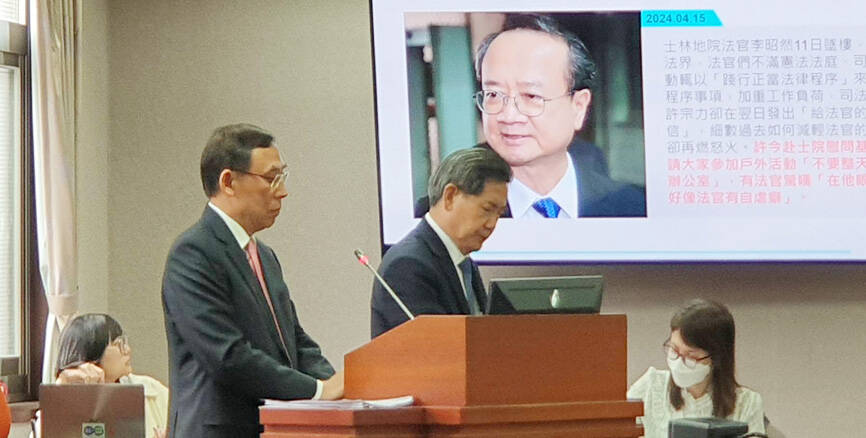The Judicial Yuan yesterday said it has proposed amendments to the Court Organization Act (法院組織法) and other laws in a bid to hire more judicial staff and tackle the issue of overwork.
Case numbers have risen significantly in the past few years, which has led to judges, clerks and other staff being overworked, the Judicial Yuan said.
A judge fell to his death from a building, a judge fell into a coma in his office and a clerk passed away from illness, it said, citing what it called cases linked to overwork.

Photo: Yang Kuo-wen, Taipei Times
To meet its personnel needs and process outstanding cases, 5,536 new staff would need to be hired, it said.
“We hope the Executive Yuan’s Directorate-General of Personnel Administration can recognize the urgent need for additional judiciary staff,” it said, adding that it hoped the Act Governing the Total Number of Personnel Headcounts of Central Government Agencies (行政院人事行政總處) could be amended to allow more hiring.
A Judicial Yuan report said that the number of annual cases received by local courts over the past decade grew by 28 percent from 2.84 million in 2014 to 3.63 million last year.
The number of open cases also rose, increasing from 187,635 in 2014 to 367,171 last year, or 96 percent, the report said.
Although measures have been implemented to reduce the burden on the court system, it was still unable to keep up with the growth in case numbers, it said.
The law stipulates that the Judicial Yuan and its agencies combined are allowed a maximum of 15,000 staff members.
The agencies budgeted for 14,508 staff members this year, but an additional 5,536 would be needed to clear open cases, the Judicial Yuan said.
The Legislative Yuan’s Judiciary and Organic Laws and Statutes Committee yesterday met with Judicial Yuan Secretary-General Wu San-lung (吳三龍) and cross-party legislators.
The committee asked Wu to prepare a report on how the burden on the court system could be reduced through “administrative simplification, litigation reduction and the application of technology.”
Democratic Progressive Party (DPP) caucus secretary-general Rosalia Wu (吳思瑤) echoed calls for an increase in judicial hirings, and called for better treatment of judicial personnel and the implementation of a dispute pyramid, which would see more issues settled outside of court.
DPP Legislator Chen Chun-yu (陳俊宇) asked Wu what a reasonable caseload would be for the judiciary.
Wu said that he would discuss the issue with judicial staff.
Chinese Nationalist Party (KMT) Legislator Lo Chih-chiang (羅智強) also called for increased hiring of judicial staff and said he had drafted an amendment on the issue.
Taiwan People’s Party Legislator Huang Kuo-chang (黃國昌) said that the Judges’ Association of the Republic of China had already issued a statement asking the Judicial Yuan to tackle the staff shortage issue and to respond to it with a proposal within one month.
Wu said he would do his best to respond to the association within that time.

Right-wing political scientist Laura Fernandez on Sunday won Costa Rica’s presidential election by a landslide, after promising to crack down on rising violence linked to the cocaine trade. Fernandez’s nearest rival, economist Alvaro Ramos, conceded defeat as results showed the ruling party far exceeding the threshold of 40 percent needed to avoid a runoff. With 94 percent of polling stations counted, the political heir of outgoing Costa Rican President Rodrigo Chaves had captured 48.3 percent of the vote compared with Ramos’ 33.4 percent, the Supreme Electoral Tribunal said. As soon as the first results were announced, members of Fernandez’s Sovereign People’s Party

MORE RESPONSIBILITY: Draftees would be expected to fight alongside professional soldiers, likely requiring the transformation of some training brigades into combat units The armed forces are to start incorporating new conscripts into combined arms brigades this year to enhance combat readiness, the Executive Yuan’s latest policy report said. The new policy would affect Taiwanese men entering the military for their compulsory service, which was extended to one year under reforms by then-president Tsai Ing-wen (蔡英文) in 2022. The conscripts would be trained to operate machine guns, uncrewed aerial vehicles, anti-tank guided missile launchers and Stinger air defense systems, the report said, adding that the basic training would be lengthened to eight weeks. After basic training, conscripts would be sorted into infantry battalions that would take

GROWING AMBITIONS: The scale and tempo of the operations show that the Strait has become the core theater for China to expand its security interests, the report said Chinese military aircraft incursions around Taiwan have surged nearly 15-fold over the past five years, according to a report released yesterday by the Democratic Progressive Party’s (DPP) Department of China Affairs. Sorties in the Taiwan Strait were previously irregular, totaling 380 in 2020, but have since evolved into routine operations, the report showed. “This demonstrates that the Taiwan Strait has become both the starting point and testing ground for Beijing’s expansionist ambitions,” it said. Driven by military expansionism, China is systematically pursuing actions aimed at altering the regional “status quo,” the department said, adding that Taiwan represents the most critical link in China’s

‘REALLY PROUD’: Nvidia would not be possible without Taiwan, Huang said, adding that TSMC would be increasing its capacity by 100 percent Nvidia Corp CEO Jensen Huang (黃仁勳) on Saturday praised and lightly cajoled his major Taiwanese suppliers to produce more to help power strong demand for artificial intelligence (AI), capping a visit to the country of his birth, where he has been mobbed by adoring fans at every step. Speaking at an impromptu press conference in the rain outside a Taipei restaurant, where he had hosted suppliers for a “trillion-dollar dinner,” named after the market capitalization of those firms attending, Huang said this would be another good year for business. “TSMC needs to work very hard this year because I need a lot